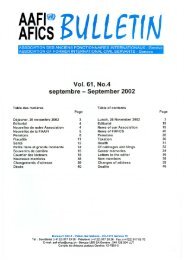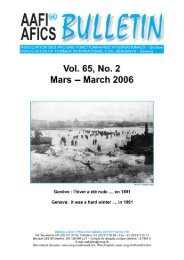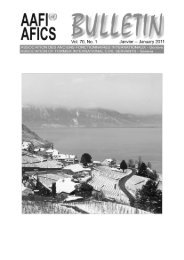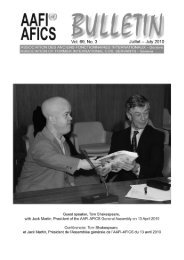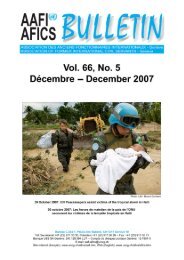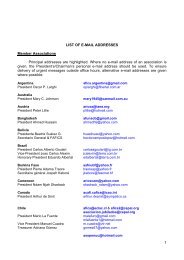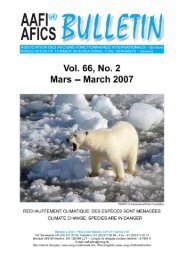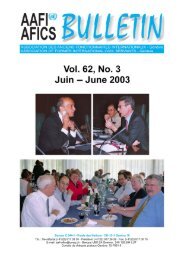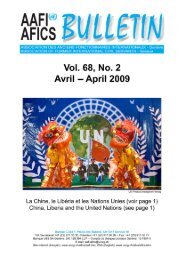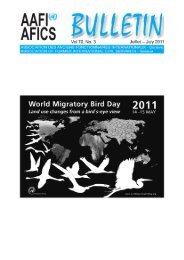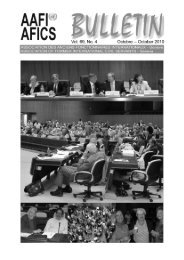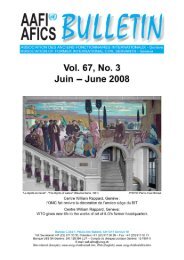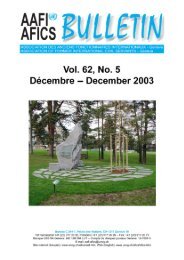pensions - aafi-afics - UNOG
pensions - aafi-afics - UNOG
pensions - aafi-afics - UNOG
You also want an ePaper? Increase the reach of your titles
YUMPU automatically turns print PDFs into web optimized ePapers that Google loves.
owing to illness, infirmity or similar causes. The result, with such a narrow definition of its field of intervention, is<br />
that the Fund recorded only 15 disbursements in 2001-2002, leaving unspent the larger part of its<br />
appropriations, whereas demand and real needs are notoriously more important. This situation has been on the<br />
agenda of the Board for years without avail, although it is generally recognised that it is not satisfactory.<br />
8. The connection with the problem of the beneficiaries in the former USSR is clear as it had been<br />
envisaged to resort to the Emergency Fund to bring relief the these unfortunate former colleagues, but the idea<br />
was discarded because it could not be accommodated within the regulations in force. So, the case of the<br />
Russian, Ukrainian and Bielorussian former beneficiaries remains unsolved after 10 years of sterile discussions,<br />
everybody seeming to be deeply sorry for this deplorable state of affairs but looking at it with much more<br />
resignation than determination.<br />
9. Another feature of the attitude of the managing board of the Fund is its dislike for recognising clearly<br />
unpleasant facts: the present situation of retirees, with the sacrifices imposed on them, is such an unpleasant<br />
fact. It is enlightening to read the comments made by the Tripartite Working Group and recalled in the report of<br />
the Board (para.131) without any explicit endorsement: “The economy measures impacted quite heavily on<br />
beneficiaries”; the lowering of the threshold from 3 to 2 percent for cost-of-living adjustment “did not go far<br />
enough to address the significant share of past economy measures that beneficiaries had assumed.…The<br />
Tripartite Working Group agreed that upon retirement, beneficiaries should be able to count on a pension that,<br />
in line with the income replacement principle, provided a standard of living compatible with that enjoyed in the<br />
last years of service. The Tripartite Working Group agreed that to apply an arbitrary 1,5 percent reduction in the<br />
first cost-of-living adjustment seemed (our emphasis) to be contrary to that principle”.<br />
10. AFICS has agreed to adopt a critical view on the perception of the nature of the Fund generally shared<br />
by its sister associations. It is easy to find in the report of the Board examples of the misconceptions commonly<br />
accepted in this regard. One of them illustrates both the temptations which are generated by such<br />
misconceptions and the stubbornness of the Board when some obstacle is raised against its vagaries. Although<br />
it has sometimes been lucidly recognised that the Fund was a financial institution, essentially a pension<br />
scheme, and not an insurance company, a few voices proposed that provision should be made to allow for the<br />
purchase of additional years of contributory service. In other words, the Board, in entertaining the idea, refused<br />
to consider that this amounted to use the services of the Fund as if it were an insurance company operating on<br />
the rent market. Less understandable still, although the Committee of Actuaries, duly consulted on such a<br />
question, considering “the design and collective nature of the Fund…felt unable to support the recommendation<br />
to provide for the purchase of additional years of service” (essentially for the reason of substance that it was<br />
practically impossible to ensure the actuarial neutrality of such operations), the Board nevertheless requested<br />
the CEO/Secretary to consult again with the actuaries on “a reformulated proposal for the purchase of added<br />
years of contributory service”. (para. 134)<br />
11. Offering a pension representing a given ratio of income replacement and guaranteeing the stability of<br />
such an income would seem to be a reasonable programme for the institution and well enough to need full use<br />
of its assets. The first part of this programme has been successfully carried into effect but the second part, of<br />
paramount importance, is still raising problems. It should be realised that, in reaching maturity, the Fund is<br />
progressively loosing flexibility, being more and more sensitive to the fluctuations in the rate of return on its<br />
investments, an element which, as shown by current developments, may be extremely volatile. The Board,<br />
however, for so-called social concerns, is still thinking of enhancing benefits whereas past economy measures<br />
remain in force. To that end, it would be ready to extend to 65 the age of mandatory retirement, a measure<br />
conceivably acceptable if intended to maintain the actuarial equilibrium of the Fund, but questionable if its aim is<br />
the creation of new benefits or the enhancement of existing ones. For there is no built-in limit to actions based<br />
on social considerations and the normal way for their promoters to translate their aspirations into reality is to<br />
have them financed by an anonymous collectivity. This kind of illusion is at work in the minds of the participants<br />
who, unconsciously or not, may think that they can buy new benefits for a third of their value, as the<br />
organisations have a two-third share in the financing of the institution. On their side, the organisations have an<br />
idée fixe which is to minimise their rate of contribution. These conflicting projects form a very unsound basis for<br />
the management of the Fund and all parties concerned should realise that it is in their common interest to come<br />
back to a more reasonable and rigorous view of the objectives of the Fund.<br />
12. Whatever the subject, be it the survivors’ benefits or benefits to separated or divorced spouses any<br />
enhancement will unavoidably entail either increasing contributions or pushing the Fund into a permanent<br />
situation of actuarial deficit and to more stringent economy measures which, as shown by experience, would<br />
impact heavily on retirees. The Fund provides for basic survivors’ benefits and whether they are sufficient or not<br />
41



